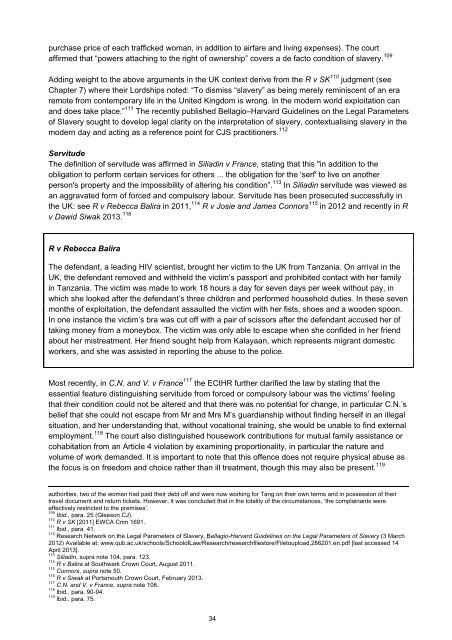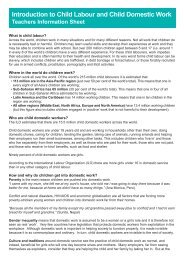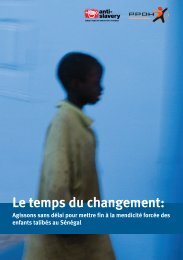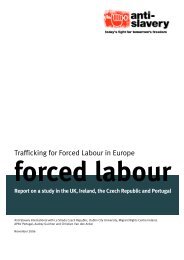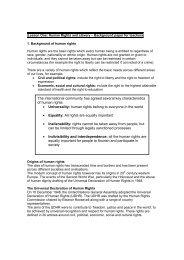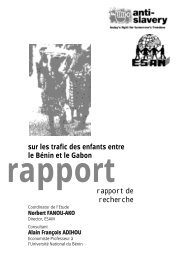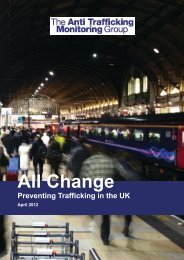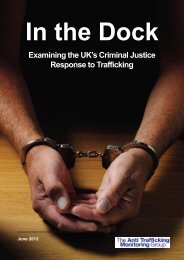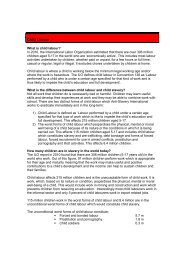purchase price of each trafficked woman, in addition to airfare and living expenses). The courtaffirmed that “powers attaching to <strong>the</strong> right of ownership” covers a de facto condition of slavery. 109Adding weight to <strong>the</strong> above arguments in <strong>the</strong> UK context derive from <strong>the</strong> R v SK 110 judgment (seeChapter 7) where <strong>the</strong>ir Lordships noted: “To dismiss “slavery” as being merely reminiscent of an eraremote from contemporary life in <strong>the</strong> United Kingdom is wrong. <strong>In</strong> <strong>the</strong> modern world exploitation canand does take place.” 111 The recently published Bellagio–Harvard Guidelines on <strong>the</strong> Legal Parametersof Slavery sought to develop legal clarity on <strong>the</strong> interpretation of slavery, contextualising slavery in <strong>the</strong>modern day and acting as a reference point for CJS practitioners. 112ServitudeThe definition of servitude was affirmed in Siliadin v France, stating that this "in addition to <strong>the</strong>obligation to perform certain services for o<strong>the</strong>rs ... <strong>the</strong> obligation for <strong>the</strong> 'serf' to live on ano<strong>the</strong>rperson's property and <strong>the</strong> impossibility of altering his condition”. 113 <strong>In</strong> Siliadin servitude was viewed asan aggravated form of forced and compulsory labour. Servitude has been prosecuted successfully in<strong>the</strong> UK: see R v Rebecca Balira in 2011, 114 R v Josie and James Connors 115 in 2012 and recently in Rv Dawid Siwak 2013. 116R v Rebecca BaliraThe defendant, a leading HIV scientist, brought her victim to <strong>the</strong> UK from Tanzania. On arrival in <strong>the</strong>UK, <strong>the</strong> defendant removed and withheld <strong>the</strong> victim’s passport and prohibited contact with her familyin Tanzania. The victim was made to work 18 hours a day for seven days per week without pay, inwhich she looked after <strong>the</strong> defendant’s three children and performed household duties. <strong>In</strong> <strong>the</strong>se sevenmonths of exploitation, <strong>the</strong> defendant assaulted <strong>the</strong> victim with her fists, shoes and a wooden spoon.<strong>In</strong> one instance <strong>the</strong> victim’s bra was cut off with a pair of scissors after <strong>the</strong> defendant accused her oftaking money from a moneybox. The victim was only able to escape when she confided in her friendabout her mistreatment. Her friend sought help from Kalayaan, which represents migrant domesticworkers, and she was assisted in reporting <strong>the</strong> abuse to <strong>the</strong> police.Most recently, in C.N. and V. v France 117 <strong>the</strong> ECtHR fur<strong>the</strong>r clarified <strong>the</strong> law by stating that <strong>the</strong>essential feature distinguishing servitude from forced or compulsory labour was <strong>the</strong> victims’ feelingthat <strong>the</strong>ir condition could not be altered and that <strong>the</strong>re was no potential for change, in particular C.N.’sbelief that she could not escape from Mr and Mrs M’s guardianship without finding herself in an illegalsituation, and her understanding that, without vocational training, she would be unable to find externalemployment. 118 The court also distinguished housework contributions for mutual family assistance orcohabitation from an Article 4 violation by examining proportionality, in particular <strong>the</strong> nature andvolume of work demanded. It is important to note that this offence does not require physical abuse as<strong>the</strong> focus is on freedom and choice ra<strong>the</strong>r than ill treatment, though this may also be present. 119authorities, two of <strong>the</strong> women had paid <strong>the</strong>ir debt off and were now working for Tang on <strong>the</strong>ir own terms and in possession of <strong>the</strong>irtravel document and return tickets. However, it was concluded that in <strong>the</strong> totality of <strong>the</strong> circumstances, ‘<strong>the</strong> complainants wereeffectively restricted to <strong>the</strong> premises’.109Ibid., para. 25 (Gleeson CJ).110R v SK [2011] EWCA Crim 1691.111Ibid., para. 41.112Research Network on <strong>the</strong> Legal Parameters of Slavery, Bellagio-Harvard Guidelines on <strong>the</strong> Legal Parameters of Slavery (3 March2012) Available at: www.qub.ac.uk/schools/SchoolofLaw/Research/researchfilestore/Filetoupload,286201,en.pdf [last accessed 14April 2013].113Siliadin, supra note 104, para. 123.114R v Balira at Southwark Crown Court, August 2011.115Connors, supra note 50.116R v Siwak at Portsmouth Crown Court, February 2013.117C.N. and V. v France, supra note 106.118Ibid., para. 90-94.119Ibid., para. 75.34
Forced or compulsory labourThe definition of forced or compulsory labour, as reproduced in Article 4 of <strong>the</strong> ECHR is to beintentionally read with <strong>the</strong> <strong>In</strong>ternational Labour Organization (ILO) convention concerning Forced orCompulsory Labour (No.29), which defines forced or compulsory labour as “all work or service whichis exacted from any person under <strong>the</strong> menace of any penalty and for which <strong>the</strong> said person has notoffered himself voluntarily”. Forced labour may also be distinguished from labour exploitation bylooking at <strong>the</strong> ability of <strong>the</strong> worker to exit <strong>the</strong> situation, which <strong>the</strong> ILO describes as <strong>the</strong> ability to“revoke a labour agreement without losing any rights or privileges, including in this, <strong>the</strong> right topromised wages”. 120 If <strong>the</strong> worker cannot exit <strong>the</strong>ir situation, without losing owed wages or beingdenounced to <strong>the</strong> authorities, this would be considered forced labour. If <strong>the</strong> worker is free to leavewithout <strong>the</strong> loss of wages or o<strong>the</strong>r privileges, this is not classed as forced labour. 121Both <strong>the</strong> CPS Guidance 122 and <strong>the</strong> Ministry of Justice Circular, 123 which accompanied <strong>the</strong> newoffences states that <strong>the</strong> s.71 offence requires an element of coercion or deception. Though <strong>the</strong>Guidance and Circular go on to replicate <strong>the</strong> list of non-exhaustive indicators <strong>the</strong>se concepts are notfleshed out and <strong>the</strong>refore are not adequately understood. <strong>In</strong>deed in R v John and Josie Connors <strong>the</strong>CPS guidance, which includes ILO indicators, 124 was said to have no legal standing and <strong>the</strong>refore <strong>the</strong>evidence collated against <strong>the</strong>se indicators was deemed not material to <strong>the</strong> case. <strong>In</strong>stead <strong>the</strong> courtlooked to relevant ECtHR jurisprudence for guidance.Application of definitions in practiceThe research established that erroneous interpretation of <strong>the</strong> constituent elements of <strong>the</strong> traffickingdefinition and UK anti-trafficking laws (particularly servitude and forced labour) by some CJS actorshas hampered <strong>the</strong> identification of trafficked persons (see Chapters 4 and 5). Such misinterpretationswere found to inhibit <strong>the</strong> ability of <strong>the</strong> police to address trafficking. Most concerning, examples werepresented to <strong>the</strong> ATMG relating to a misunderstood definition in terms of a trafficked person’sconsent. The international binding definition is clear that any initial consent of a person is void if s/heis a victim of trafficking. The ATMG was presented with cases where <strong>the</strong> trafficked person agreed totravel to <strong>the</strong> UK, not knowing about <strong>the</strong> real purpose of <strong>the</strong>ir trip. Their initial consent was perceivedas complicity in <strong>the</strong>ir exploitation, despite <strong>the</strong> established deception, use of threats and long workinghours for little or no recompense once in <strong>the</strong> UK. An incorrect view seems to persist that a traffickedperson needs to be abducted or forced to come to <strong>the</strong> UK against <strong>the</strong>ir will.Fur<strong>the</strong>rmore, when <strong>the</strong> trafficking network chain is protracted and complex, it was reported that <strong>the</strong>police have difficulties in applying <strong>the</strong> definition and establishing where liability should fall. Thesecomplex networks - from arranger to exploiter - which often include several intermediaries willinevitably be difficult for trafficked persons to understand including holding <strong>the</strong> belief that some of<strong>the</strong>m acted, or are still acting, in <strong>the</strong>ir best interests. Therefore it may be difficult or impossible fortrafficked persons to provide a coherent account of <strong>the</strong> chain, which can be exacerbated by <strong>the</strong>psychological impact of <strong>the</strong>ir experiences. 125 <strong>In</strong> addition, service providers reported confusion for <strong>the</strong>police when identifying trafficking where <strong>the</strong> exploiter was <strong>the</strong> trafficked person’s partner or a familymember.120Andrees, B. Forced labour and trafficking in Europe: how people are trapped in, live through and come out (ILO, 2008) p. 2.Available at: www.ilo.org/wcmsp5/groups/public/@ed_norm/@declaration/documents/publication/wcms_090548.pdf [last accessed 12March 2012].121Ibid., p. 7.122CPS legal guidance, supra note 107.123Ministry of Justice, Circular 2010/07 Slavery, servitude and forced or compulsory labour: Implementation of section 71 of <strong>the</strong>Coroners and Justice Act 2009 (Criminal Law Policy Unit, 19 March 2010). Available at: www.library.npia.police.uk/docs/moj/circular-2010-07-coroners-justice-act-s71.pdf [last accessed 15 May 2013].124ILO, ILO indicators of Forced Labour (1 October 2012). Available at:www.ilo.org/sapfl/<strong>In</strong>formationresources/Factsheetsandbrochures/WCMS_203832/lang--en/index.htm [last accessed 14 March 2013]125Herlily et al, ‘Asylum claims and memory of trauma: sharing our knowledge’ The British Journal of Psychiatry Vol.191: 3-4 (2007).35
- Page 1 and 2: In the DockExamining the UK’s Cri
- Page 3 and 4: AcknowledgementsThis report was mad
- Page 5 and 6: PrefaceIn May 2009, a group of nine
- Page 7 and 8: Misconceptions around exploitation
- Page 9 and 10: Acronyms and abbreviations frequent
- Page 11 and 12: Executive SummaryIn the Dock is The
- Page 13 and 14: Furthermore, the current legislatio
- Page 15 and 16: The ATMG was made aware of some cas
- Page 17 and 18: • Introduce mandatory child-speci
- Page 19 and 20: • The UK’s ability to meet the
- Page 21 and 22: Traffickers’ primary motivation i
- Page 23 and 24: • Money launderers - turn profits
- Page 25 and 26: out to perpetuate the exploitative
- Page 27 and 28: [their] own enslavement” is as fu
- Page 29 and 30: Chapter 2: UK Anti-Trafficking Legi
- Page 31 and 32: nationals who commit trafficking of
- Page 33 and 34: Like the SOA, the “act” element
- Page 35: (b) D requires another person to pe
- Page 39 and 40: ConclusionAs a consequence of the s
- Page 41 and 42: concerningly, the number of convict
- Page 43 and 44: women who were recruited in Poland
- Page 45 and 46: Chapter 4: Identifying trafficking
- Page 47 and 48: Misconceptions around exploitationT
- Page 49 and 50: espond inadequately to a trafficked
- Page 51 and 52: multi-agency teams was described by
- Page 53 and 54: Josie Connors. 179 In summary, inte
- Page 55 and 56: defending a trafficked person for f
- Page 57 and 58: “[B]ecause the NRM decision is on
- Page 59 and 60: PTSD. 196 A Consultant Psychiatrist
- Page 61 and 62: etween the client and the police, i
- Page 63 and 64: Regular communication needs to be s
- Page 65 and 66: Priority planningA particular issue
- Page 67 and 68: Chapter 6: Multi-agency and interna
- Page 69 and 70: canvassing for tarmacking opportuni
- Page 71 and 72: Despite this, it would appear that
- Page 73 and 74: Good practice - Operation Golf 229O
- Page 75 and 76: Chapter 7: Criminal proceedingsThe
- Page 77 and 78: Law enforcement working on the case
- Page 79 and 80: trafficking require particular unde
- Page 81 and 82: JuryPractitioners suggested that th
- Page 83 and 84: years”. 258 Ambiguity within the
- Page 85 and 86: officer stated that not all judges
- Page 87 and 88:
jurors to be assisted with expert e
- Page 89 and 90:
Good feedback was received from sem
- Page 91 and 92:
The Convention does recognise that
- Page 93 and 94:
Another option for trafficked victi
- Page 95 and 96:
There are two models with respect t
- Page 97 and 98:
1. Is there clear evidence that the
- Page 99 and 100:
decision can be taken into account
- Page 101 and 102:
also entails being “alert to the
- Page 103 and 104:
In some cases concerns were even ra
- Page 105 and 106:
Chapter 9: Prosecuting child traffi
- Page 107 and 108:
However, many children are not refe
- Page 109 and 110:
trafficking”. 352 It states: “W
- Page 111 and 112:
Previous research has found that th
- Page 113 and 114:
children as well as assisting in pr
- Page 115 and 116:
Child trafficking trainingThere is
- Page 117 and 118:
were too traumatic to involve them
- Page 119 and 120:
committed by a child whilst in a co
- Page 121 and 122:
• Introduce mandatory child-speci
- Page 123 and 124:
IdentificationThe PSNI is the main
- Page 125 and 126:
participants suggest that this is b
- Page 127 and 128:
The PPS stated that the reasons for
- Page 129 and 130:
this research was aware of potentia
- Page 131 and 132:
convictions of traffickers prosecut
- Page 133 and 134:
Possibly in response to certain hur
- Page 135 and 136:
espectively. In addition to custodi
- Page 137 and 138:
Conclusion and RecommendationsThe A
- Page 139 and 140:
CRIMINAL PROCEEDINGS• Ensure that
- Page 141 and 142:
Crown Prosecution Service, Legal Gu
- Page 143 and 144:
Herman. J. Trauma and Recovery: The
- Page 145 and 146:
Annex I: Trafficking and other form
- Page 147 and 148:
(a) on summary conviction, to impri
- Page 149 and 150:
(b) which country is the country of
- Page 151 and 152:
2009 Istvan Kalocsai (Snr)MetS.57 o
- Page 153 and 154:
2009 causing actual bodily harm, su
- Page 155 and 156:
Skirmantas Kvedaras Feed, 2010 Rape
- Page 157 and 158:
2012 Ahdel Ali (24)Mubarek Ali (29)
- Page 159 and 160:
Annex III: The CPS’s Seven Stages
- Page 161 and 162:
159


